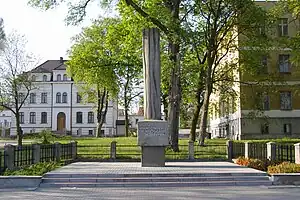| Oflag XXI-B | |
|---|---|
| Szubin, German-occupied Poland | |
 Memorial to the prisoners and victims of the German POW camps in Szubin | |
 Oflag XXI-B | |
| Coordinates | 53°1′N 17°45′E / 53.017°N 17.750°E |
| Type | Prisoner-of-war camp |
| Site information | |
| Controlled by | |
| Site history | |
| In use | 1940–1943 |
| Garrison information | |
| Occupants | Polish, French, British, Canadian, Australian, New Zealand, American, and other Allied officers |
Oflag XXI-B and Stalag XXI-B were World War II German prisoner-of-war camps for officers and enlisted men, located at Szubin a few miles southwest of Bydgoszcz, Poland, which at that time was occupied by Nazi Germany.
Timeline

Former Polish boys' school, occupied by the Stalag XXI-B, Oflag XXI-B and Oflag 64 POW camps during the German occupation of Poland
- September 1939 – The Germans established a camp for arrested Polish civilians, mostly the intelligentsia, arrested as part of the Intelligenzaktion.[1]
- October 1939 – First Polish soldiers captured during the German Invasion of Poland (1939) brought to Szubin, Kriegsgefangenenlager Schubin prisoner-of-war camp for Poles established.[1] The camp was built around a Polish boys' school by adding barracks. Polish POWs were used for the expansion of the camp.
- December 1939 - The Germans formally established the Stalag XXI-B2 POW camp in Szubin, and the Stalag XXI-B1 POW camp in Antoniewo near Skoki, both for Polish POWs.[1]
- March-May 1940 - Polish POWs were transferred to other camps, located in Germany.[1]
- June 1940 - French officers were brought here from the Battle of France.
- August 1940 - Stalag XXI-B2 was renamed to Stalag XXI-B; Stalag XXI-B1 in Antoniewo was renamed to Stalag XXI-B/Z, and made a branch camp of the Stalag XXI-B in Szubin.[1]
- September 1940 - Oflag XXI-B for Allied officers established.[1] Its first prisoners were the French.[1] Stalag XXI-B and Oflag XXI-B co-existed next to each other for three months.[1]
- December 1940 – Stalag XXI-B was relocated to the nearby village of Tur.[1] Polish officers, previously held together with enlisted men in other camps, were moved to Oflag XXI-B.
- 1941/1942 – All French officers had been transferred elsewhere prior to the arrival of British officer POWs.
- September 1942 – British and Commonwealth officers of the Royal Air Force and Fleet Air Arm were transferred from Oflag VI-B at Warburg following its temporary closure. These included airmen from Poland, Czechoslovakia and other occupied countries serving in the RAF, as well as airmen from the Allied Air Forces - RAAF, RNZAF, RCAF, SAAF, USAAF.[2]
- October 1942 – More British RAF Officers and NCOs arrive from Stalag Luft III to help relieve overcrowding there.
- November 1942 – A second batch of British RAF officers arrive from Stalag Luft III
- October to March 1943 - Newly captured British, American and Allied Air Force officers arrive in batches transferred from Dulag luft.
- March 1943 – A mass escape through a tunnel occurs - 35 men escape, albeit none are successful in reaching neutral territory.[3]
- April 1943 – The camp is cleared of all POWs - all being sent to the enlarged Stalag Luft III.
- The camp was later re-opened and re-numbered Oflag 64 for American officers only.
Notable prisoners
- William Ash – American serving in RCAF, escapee and future author
- Anthony Barber – RAF pilot and future Chancellor of the Exchequer
- Per Bergsland – Norwegian pilot serving in RAF and Great Escape
- Josef Bryks – Czechoslovak RAFVR fighter pilot and serial escaper (1942 – March 1943).[4]
- Jimmy Buckley RN – Fleet Air Arm Pilot and escapee
- Flight Lieutenant CC Cheshire – RAF Pilot and brother of Leonard Cheshire VC
- Aidan Crawley – RAF Officer and future author, journalist and MP
- Wing Commander Harry Day, Great Escape survivor, who was Senior British Officer November 1942 – March 1943
- Johnnie Dodge – British Army officer and Great Escape survivor
- Flight Lieutenant Bertram James – RAF Pilot and Great Escape survivor
- Robert Kee – RAF Pilot and future author and journalist
- Oliver Philpot – RAF Pilot and escapee
- Peter Stevens – RAF pilot of German-Jewish birth and serial escapee
- Jorgen Thalbitzer – Danish pilot serving in RAF
- Eric Williams – RAF Officer and escapee
- Albert W Harris - Private. The Buffs Royal East Kent Regiment.
References
- 1 2 3 4 5 6 7 8 9 "POW Camps in Szubin (Schubin/Altburgund)". Polish-American Foundation for the Commemoration of POW Camps in Szubin. Retrieved 8 August 2021.
- ↑ WO208/3296 Official Camp History Chapter I
- ↑ WO208/3296 Official Camp History Chapter II Para 24
- ↑ "Josef Bryks". Free Czechoslovak Air Force. 20 February 2011. Retrieved 27 October 2017.
Sources
- Chew, JD. "Letters Home". Prisoner of War (1939–1945). Archived from the original on 2008-08-20.
{{cite web}}: CS1 maint: bot: original URL status unknown (link) - "Letters of Colin N. Dilly from Oflag XXI-B and Stalag Luft 3". BBC Online. Archived from the original on 2009-09-10.
- Gustavsson, Håkan (1 September 2008). "Squadron Leader George Dudley Craig OBE, RAF no. 90285". Biplane fighter aces. Håkan Gustavsson.
See also
This article is issued from Wikipedia. The text is licensed under Creative Commons - Attribution - Sharealike. Additional terms may apply for the media files.